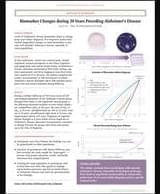We conducted a multicenter, nested case–control study of Alzheimer’s disease biomarkers in cognitively normal participants who were enrolled in the China Cognition and Aging Study from January 2000 through December 2020. A subgroup of these participants underwent testing of cerebrospinal fluid (CSF), cognitive assessments, and brain imaging at 2-year–to–3-year intervals. A total of 648 participants in whom Alzheimer’s disease developed were matched with 648 participants who had normal cognition, and the temporal trajectories of CSF biochemical marker concentrations, cognitive testing, and imaging were analyzed in the two groups.
The median follow-up was 19.9 years (interquartile range, 19.5 to 20.2). CSF and imaging biomarkers in the Alzheimer’s disease group diverged from those in the cognitively normal group at the following estimated number of years before diagnosis: amyloid-beta (Aβ)42, 18 years; the ratio of Aβ42 to Aβ40, 14 years; phosphorylated tau 181, 11 years; total tau, 10 years; neurofilament light chain, 9 years; hippocampal volume, 8 years; and cognitive decline, 6 years. As cognitive impairment progressed, the changes in CSF biomarker levels in the Alzheimer’s disease group initially accelerated and then slowed.
In this study involving Chinese participants during the 20 years preceding clinical diagnosis of sporadic Alzheimer’s disease, we observed the time courses of CSF biomarkers, the times before diagnosis at which they diverged from the biomarkers from a matched group of participants who remained cognitively normal, and the temporal order in which the biomarkers became abnormal. (Funded by the Key Project of the National Natural Science Foundation of China and others; ClinicalTrials.gov number, NCT03653156. opens in new tab.)










Comments are closed.